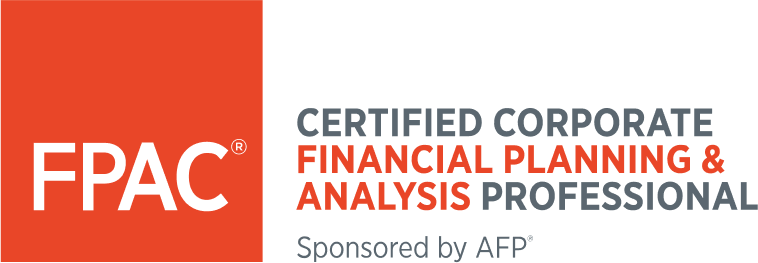Benefits of Certification
Watch the video: Why the FPAC Credential?
Stand Out in the Field
CFOs are seeking professionals with planning, forecasting and analysis skills combined with an ability to see the overall strategy of the organization. FPAC credential holders naturally step to the forefront as financial experts, strategic and adept communicators, and trusted advisors to the business.
Earn More with an FP&A Certification
| JOB TITLE | AVERAGE DOLLAR DIFFERENCE | AVERAGE % BASE SALARY DIFFERENCE |
| Manager FP&A | $8,019 | 6% |
| CFO | $41,210 | 14% |
| VP Finance | $33,719 | 14% |
*2023 AFP Compensation Survey: Salary difference for FPAC credential holders vs non-holders.
Establish Yourself as a Leader in FP&A
COMPETENCY VALIDATION
Exhibit your understanding of the core competencies of FP&A, especially those that are not necessarily covered by a traditional degree, such as an MBA. And it’s the only credential that is specific to the field—it is forward looking and assesses technical skills as well as the ability to see the big picture.

DEMONSTRATE YOUR PASSION FOR FP&A
Earning and maintaining the FPAC credential confirms your commitment to your profession and identifies you as someone ready to drive FP&A and the organization forward.

STANDARDS OF ETHICAL CONDUCT
FPAC credential holders have an obligation to their employers, co-workers, customers, shareholders, the profession and themselves to maintain the highest standards of conduct and to encourage their peers to do likewise. FPAC holders must agree to abide by these ethical standards.

BUILD A GLOBAL PROFESSIONAL NETWORK
FPAC credential holders work in 65+ countries and can connect through AFP. Be part of a global network via the virtual AFP Collaborate group or attend the largest conference for treasury and finance professionals each year.
Gain Knowledge and Skills as You Prepare
96% of FPAC credential holders say the certification and its study material are relevant to their job. That's because the Certified Corporate FP&A Professional credential was created by FP&A Professionals for FP&A Professionals. And almost 90% see the certification as valuable to their career. The top reasons?
> I added knowledge and skills when preparing for the exam
> The prep materials are relevant to my job
> I received a salary increase upon earning the credential
> It assisted my transition into an FP&A role
>
It differentiated me from others in finance


